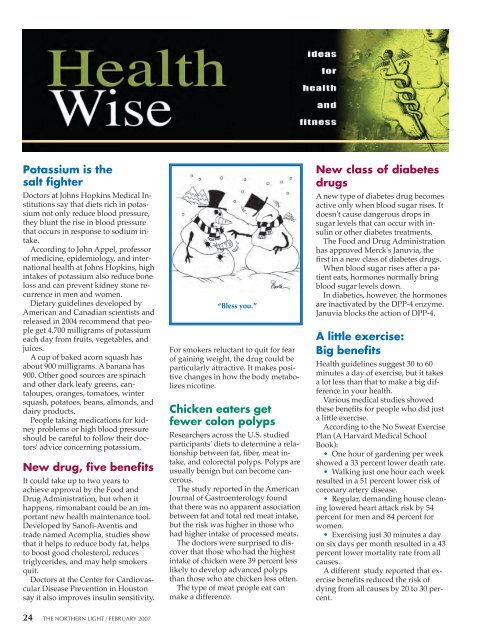February - Scottish Rite
February - Scottish Rite
February - Scottish Rite
You also want an ePaper? Increase the reach of your titles
YUMPU automatically turns print PDFs into web optimized ePapers that Google loves.
Potassium is the<br />
salt fighter<br />
Doctors at Johns Hopkins Medical Institutions<br />
say that diets rich in potassium<br />
not only reduce blood pressure,<br />
they blunt the rise in blood pressure<br />
that occurs in response to sodium intake.<br />
According to John Appel, professor<br />
of medicine, epidemiology, and international<br />
health at Johns Hopkins, high<br />
intakes of potassium also reduce bone<br />
loss and can prevent kidney stone recurrence<br />
in men and women.<br />
Dietary guidelines developed by<br />
American and Canadian scientists and<br />
released in 2004 recommend that people<br />
get 4,700 milligrams of potassium<br />
each day from fruits, vegetables, and<br />
juices.<br />
A cup of baked acorn squash has<br />
about 900 milligrams. A banana has<br />
900. Other good sources are spinach<br />
and other dark leafy greens, cantaloupes,<br />
oranges, tomatoes, winter<br />
squash, potatoes, beans, almonds, and<br />
dairy products.<br />
People taking medications for kidney<br />
problems or high blood pressure<br />
should be careful to follow their doctors'<br />
advice concerning potassium.<br />
New drug, five benefits<br />
It could take up to two years to<br />
achieve approval by the Food and<br />
Drug Administration, but when it<br />
happens, rimonabant could be an important<br />
new health maintenance tool.<br />
Developed by Sanofi-Aventis and<br />
trade named Acomplia, studies show<br />
that it helps to reduce body fat, helps<br />
to boost good cholesterol, reduces<br />
triglycerides, and may help smokers<br />
quit.<br />
Doctors at the Center for Cardiovascular<br />
Disease Prevention in Houston<br />
say it also improves insulin sensitivity.<br />
“Bless you.”<br />
For smokers reluctant to quit for fear<br />
of gaining weight, the drug could be<br />
particularly attractive. It makes positive<br />
changes in how the body metabolizes<br />
nicotine.<br />
Chicken eaters get<br />
fewer colon polyps<br />
Researchers across the U.S. studied<br />
participants' diets to determine a relationship<br />
between fat, fiber, meat intake,<br />
and colorectal polyps. Polyps are<br />
usually benign but can become cancerous.<br />
The study reported in the American<br />
Journal of Gastroenterology found<br />
that there was no apparent association<br />
between fat and total red meat intake,<br />
but the risk was higher in those who<br />
had higher intake of processed meats.<br />
The doctors were surprised to discover<br />
that those who had the highest<br />
intake of chicken were 39 percent less<br />
likely to develop advanced polyps<br />
than those who ate chicken less often.<br />
The type of meat people eat can<br />
make a difference.<br />
New class of diabetes<br />
drugs<br />
A new type of diabetes drug becomes<br />
active only when blood sugar rises. It<br />
doesn't cause dangerous drops in<br />
sugar levels that can occur with insulin<br />
or other diabetes treatments.<br />
The Food and Drug Administration<br />
has approved Merck's Januvia, the<br />
first in a new class of diabetes drugs.<br />
When blood sugar rises after a patient<br />
eats, hormones normally bring<br />
blood sugar levels down.<br />
In diabetics, however, the hormones<br />
are inactivated by the DPP-4 enzyme.<br />
Januvia blocks the action of DPP-4.<br />
A little exercise:<br />
Big benefits<br />
Health guidelines suggest 30 to 60<br />
minutes a day of exercise, but it takes<br />
a lot less than that to make a big difference<br />
in your health.<br />
Various medical studies showed<br />
these benefits for people who did just<br />
a little exercise.<br />
According to the No Sweat Exercise<br />
Plan (A Harvard Medical School<br />
Book):<br />
• One hour of gardening per week<br />
showed a 33 percent lower death rate.<br />
• Walking just one hour each week<br />
resulted in a 51 percent lower risk of<br />
coronary artery disease.<br />
• Regular, demanding house cleaning<br />
lowered heart attack risk by 54<br />
percent for men and 84 percent for<br />
women.<br />
• Exercising just 30 minutes a day<br />
on six days per month resulted in a 43<br />
percent lower mortality rate from all<br />
causes.<br />
A different study reported that exercise<br />
benefits reduced the risk of<br />
dying from all causes by 20 to 30 percent.<br />
24 THE NORTHERN LIGHT / FEBRUARY 2007














